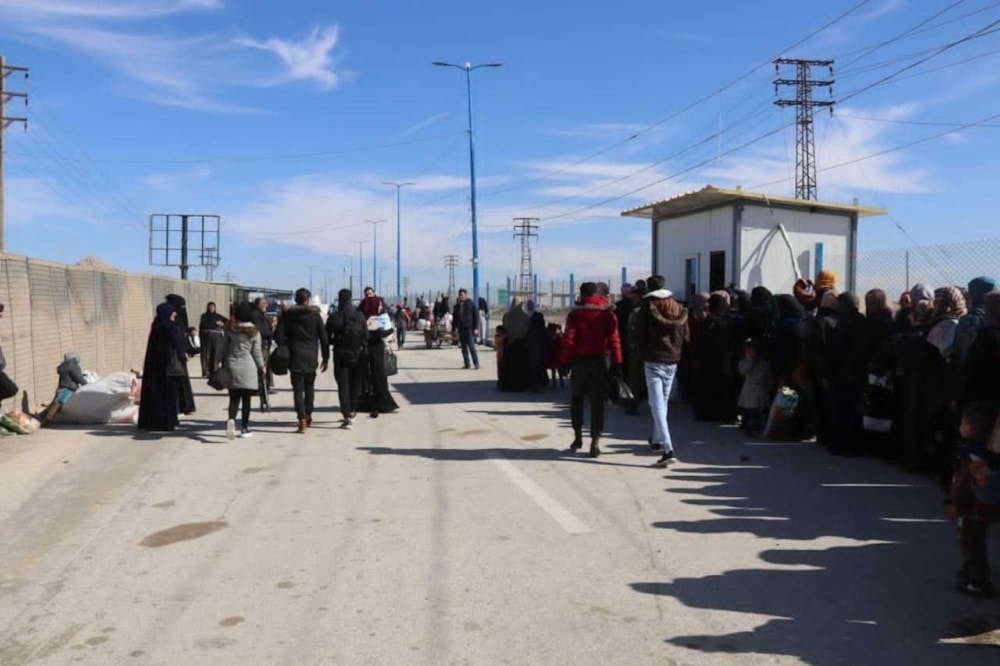Kurdish Autonomous Administration closes crossings with Syria
The Kurdish Autonomous Administration closes all crossings linking it to areas under Syrian government control in the governorates of Aleppo, Raqqa, Deir Ezzor, and the Syrian interior.
-

Syrians wait their turn to cross between areas controlled by the Syrian government and the Kurdish "self-administration areas" at the al-Salihiyah crossing, east of Deir Ezzor province (File photo)
The Asayish checkpoints affiliated with the Kurdish Autonomous Administration closed all crossings linking it with regions under Syrian government control in the provinces of Aleppo, Raqqa, and Deir Ezzor, as well as those linking them to the provinces in the Syrian interior.
The autonomous administration usually takes similar measures upon tensions between it and the Syrian government. In some cases, it has reached the point of besieging areas controlled by the Syrian government in the cities of al-Hasakah and Qamishli.
Sources from Al Mayadeen confirmed that, as of Saturday afternoon, the Asayish checkpoints affiliated with the Kurdish Autonomous Administration prevented public transport buses, cars, and trucks from entering and exiting their areas towards those controlled by the Syrian government. This blockade includes convoys of Hajj pilgrims that remain stuck at the crossing.
The sources indicated that most internal transport companies operating on the al-Hasakah - Aleppo, al-Hasakah - Damascus, and al-Hasakah - Latakia lines did not send their buses to the crossings after receiving verbal instructions to close the crossings until further notice. They noted that the instructions mentioned that students and patients might be allowed to pass through upon presenting the necessary identification documents.
'Any talk of Turkish reconciliation is a conspiracy'
If this closure continues, it will affect thousands of patients, students, travelers, and employees, as well as commercial traffic. It will prevent any communication between the areas of the autonomous administration and those controlled by the Syrian government. The majority of residents will be forced to travel by air via Qamishli International Airport to meet their needs and communicate with their relatives in other governorates.
The autonomous administration stated on Saturday that "any talk of reconciliation between the Turkish regime and Damascus is considered a major conspiracy against the Syrian people."
The statement emphasized that "any agreement with the Turkish state is against the interests of Syrians in general, and it perpetuates division and conspires against the unity of Syria and its people. Such agreements will not achieve positive results; they would exacerbate the Syrian situation and spread more chaos."
Damascus and Ankara have made positive statements, which are considered a prelude to the possibility of holding direct dialogue sessions to reach a consensus that could pave the way for reconciliation between the two sides.
These statements coincided with Iraq launching an initiative for Syrian-Turkish reconciliation, sparking speculation about the possibility of holding a Syrian-Turkish meeting in the Iraqi capital, Baghdad. This initiative is reportedly being encouraged by Russia, Iran, Saudi Arabia, and the United Arab Emirates.
Official Syrian-Turkish relations have been continuously tense, reaching the point of rupture since the beginning of the war in Syria in 2011. Turkey has adopted positions hostile to the Syrian government, supported armed groups, and participated in arming them. Through three military operations—"Euphrates Shield," "Olive Branch," and "Peace Spring"—Ankara has occupied areas including Jarablus, Azaz, al-Bab, and Afrin in the northern countryside of Aleppo, as well as Ras al-Ain and Tal Abyad in the northern countryside of al-Hasakah and Raqqa.
Damascus demands that Ankara acknowledge its readiness to completely withdraw from these areas before starting any dialogue sessions aimed at reconciliation between the two parties. This precondition has previously thwarted similar dialogue sessions sponsored by Moscow and Tehran.

 3 Min Read
3 Min Read








